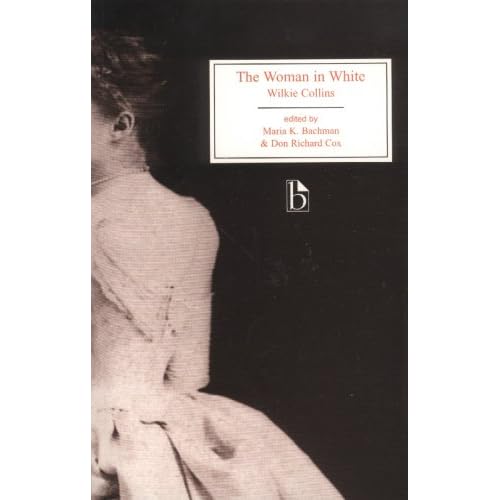The Woman in White, William Wilkie Collins

"All baronets are bad." ~ W.S. Gilbert, Ruddigore
I did not expect to like this book, from what I had heard of it. I figured I would care little for the central character, Laura. About that, I was right. She is the dullest accumulation of insipid Victorian feminine ideals I've ever met. Fortunately, although Laura and her clumsily sinister husband, Sir Percival, are the central characters, neither of them are the main characters. It is their respective allies--Laura's sister Marion and Sir Percival's suavely nefarious friend Count Fosco--who are the main characters. And what characters they are! (And yes, Hartright, too, but he's such a Standard Good Guy that I have nothing to say about him except that I can't figure out why he fell for Laura and not Marion.)
Marion has to be one of the best female characters I have ever encountered, especially in a book of this vintage. Usually female characters this strong are evil, but Marion could stare down Madame Defarge or Lady MacBeth. Or in a modern book they turn into thin feminist mock-ups trying to be One Of The Guys, but Marion remains fully a woman and even a woman of her time. She doesn't wear a corset, but it's because she doesn't need one.
Meanwhile the Count is--eww. Fascinating and charming despite his age, weight, and utter ruthlessness. An unforgettable villain.
I was first intrigued by the way of presenting the book as a series of testimonies, as if reading a series of depositions. This grabbed the lawyer in me right away, but it worked well as a literary device, too, allowing the reader to look through different people's viewpoints in a natural way and piece together the evidence one step at a time.
I see from the foreword that the author was a somewhat scandalous one in his day, and the book is meant to push at the edges of conventions. It is in following proprieties that Laura loses her fortune and endangers her life; it is through improper (though not immoral) means that justice is done. The author can critique society's conventions all he wants, but he cannot tell a rip-snorting good story without being moral, even moralizing. Good must prevail and evil be punished, and so it is.
